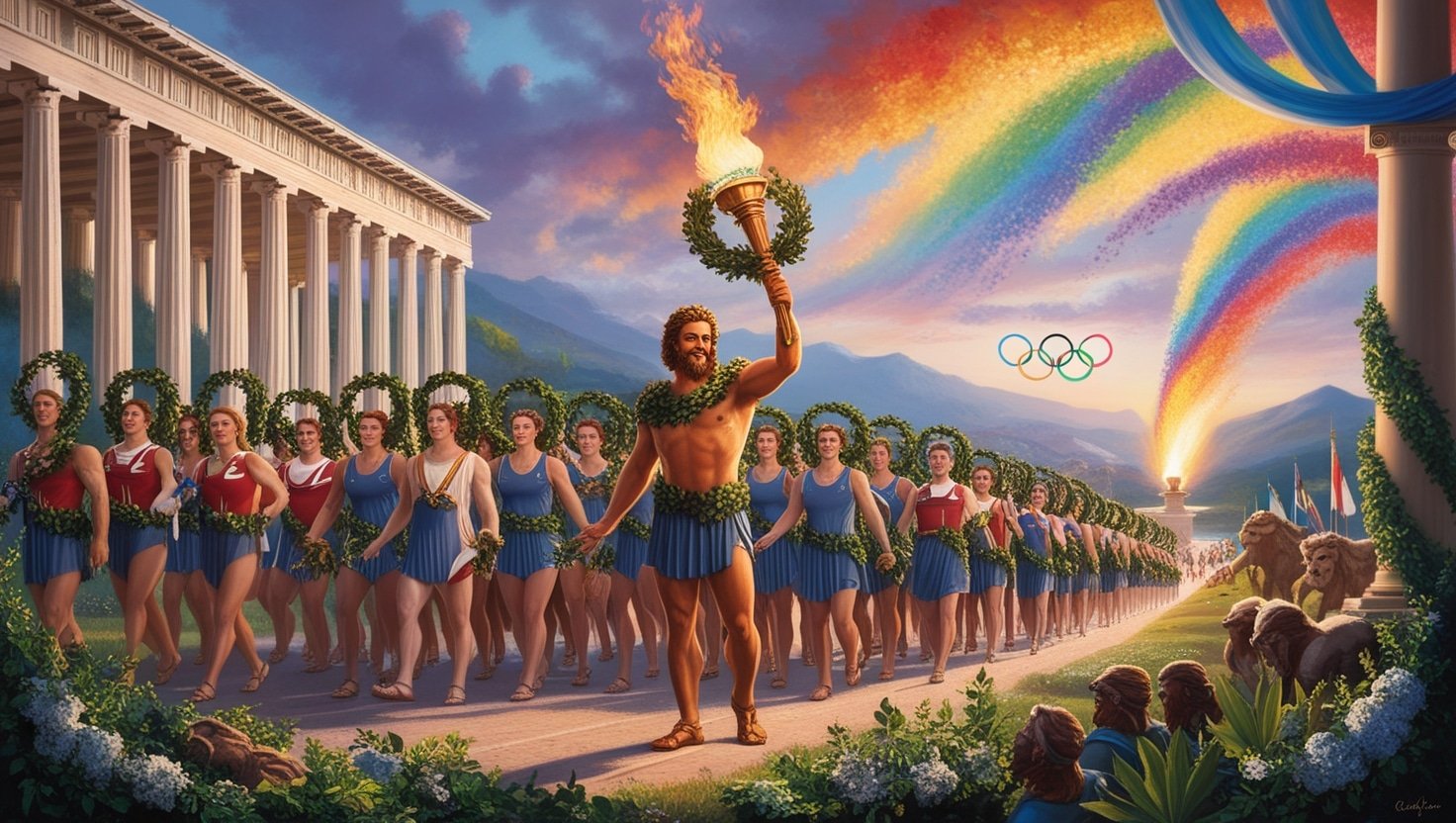Introduction: Dionysus Olympics
When we think of Greek mythology, the gods of Olympus often come to mind—each embodying different facets of human nature and divine influence. Among these gods, Dionysus stands out as a figure of immense cultural significance. Known as the god of wine, revelry, and theater, Dionysus represents a force of ecstasy and transformation. But did you know that Dionysus also has a surprising connection to the ancient Olympic Games?
Who Was Dionysus?
Dionysus, often depicted with grapevines or a wine cup, was celebrated as the god of wine, fertility, and festivity. He was unique among the Olympian gods for his ability to inspire both joy and madness. His festivals, known as Dionysia, were famous for their lively processions and dramatic performances, embodying the spirit of revelry and creativity. Dionysus was also known for his ability to bring about transformation, whether through the intoxicating effects of wine or through his influence on the arts.
Dionysus and the Ancient Olympics
The ancient Olympic Games, held in Olympia, Greece, were not just about athletic prowess—they were also deeply intertwined with religious and cultural practices. The games were dedicated to Zeus, the king of the gods, but Dionysus had a significant, though less direct, role in this grand celebration.
Dionysus’ connection to the Olympics can be seen through the influence of his festivals on the athletic events and the broader cultural atmosphere of ancient Greece. The Dionysian festivals celebrated dramatic arts and performance, which were integral to Greek culture. These festivals fostered an environment where the dramatic and theatrical elements of the games could flourish.
Dionysus in Art and Culture
Throughout history, Dionysus has been depicted in various forms of art, reflecting his complex character and influence. French painters, for instance, have captured Dionysus in their works, often blending elements of Greek mythology with contemporary interpretations. These depictions offer a glimpse into how Dionysus has been visualized through different cultural lenses, including during significant events like the Paris Olympics.
The art inspired by Dionysus often juxtaposes his chaotic nature with the structured beauty of Olympic athletics. This contrast highlights how the god’s themes of transformation and exuberance resonate within the disciplined world of sports.
The Mythological Background: Dionysus and Apollo
Apollo vs. Dionysus: A Tale of Contrasts
In Greek mythology, Apollo and Dionysus are two gods who embody strikingly different aspects of life and human experience. Apollo, the god of reason, light, and prophecy, represents order, logic, and clarity. His domains include music, healing, and the arts, but always with a sense of balance and rationality. He is often depicted as serene and composed, symbolizing the ideal of intellectual and moral harmony.
In contrast, Dionysus, the god of wine, revelry, and ecstasy, stands for the raw, untamed forces of nature. He embodies passion, chaos, and transformation. Where Apollo brings light and reason, Dionysus introduces mystery and the intoxicating freedom of emotional release. This dichotomy between Apollo’s rationality and Dionysus’ exuberance creates a fascinating contrast that reflects deeper truths about human nature.
Balancing Reason and Passion in the Olympics
This contrast between Apollo and Dionysus can also be seen in the context of the ancient Olympic Games. The Olympics were a celebration of physical prowess and athletic skill, where the disciplined training and strategic thinking of athletes mirrored Apollo’s qualities of reason and order. Competitors displayed their abilities in a structured and methodical environment, highlighting the importance of preparation and mental clarity.
Yet, Dionysus’ influence is present in the celebratory and festive aspects of the Games. The excitement, the communal spirit, and the sense of revelry that surrounded the Olympic festivities echo Dionysus’ celebration of passion and freedom. While the competitions themselves showcased Apollo’s attributes, the broader cultural environment of the Olympics also embraced the uninhibited joy and celebration that Dionysus represents.
Dionysus and Apollo: Complementary Forces in Greek Mythology
Though Apollo and Dionysus represent opposing forces, they are also complementary. Together, they illustrate the full spectrum of human experience. Apollo’s rationality and order provide a framework within which Dionysus’ passion and spontaneity can thrive. This balance is essential in Greek mythology, where the interplay between order and chaos, reason and emotion, reflects the complexities of the human condition.
In the context of the Olympics, this balance between Apollo and Dionysus mirrors the broader cultural and spiritual significance of the Games. The structured competition of the Olympics symbolizes Apollo’s order and discipline, while the celebrations and festivals surrounding it capture the exuberant spirit of Dionysus. Together, they create a rich, multifaceted experience that honors both the mind and the body, reason and passion.
By exploring the roles of Apollo and Dionysus in mythology, we gain a deeper understanding of how their contrasting yet complementary qualities shape various aspects of human culture, including the ancient Olympic Games. Their influence reminds us of the enduring need to balance intellect with emotion, order with spontaneity, in both our personal lives and in the broader celebrations of human achievement.
Dionysus in Art: Depictions from Ancient Greece to the Paris Olympics
Dionysus at the Paris Olympics: A Cultural Reflection
Dionysus, with his vibrant associations with revelry and transformation, has captured the imagination of artists across centuries. During the Paris Olympics, a significant cultural event, Dionysus’ influence was evident in the art of the time. French artists embraced the themes of Greek mythology, including the figure of Dionysus, to enrich their depictions of the Olympics and broader cultural scenes.
In paintings and sculptures from this period, Dionysus is often portrayed with elements that evoke the spirit of celebration and the dramatic flair of his festivals. Artists used his imagery to convey the festive atmosphere of the Paris Olympics, blending traditional Greek motifs with contemporary artistic styles. These depictions often highlight the god’s connection to the arts and his role in inspiring the creative spirit of the Olympics.
Olympics French Painting: Greek Mythology and Dionysus
French artists in the late 19th and early 20th centuries were deeply influenced by Greek mythology. This fascination is evident in their treatment of Dionysus, reflecting both his historical significance and his relevance to modern cultural events like the Olympics.
French painters and sculptors incorporated Dionysian themes into their works, using the god’s symbolic presence to explore ideas of celebration, transformation, and artistic inspiration. Paintings from this era often show Dionysus in dynamic poses, surrounded by scenes of revelry and theatricality. This artistic approach captures the essence of Dionysus’ character and his connection to the Olympic spirit, blending ancient myth with the excitement of contemporary sports.
Apollo and Dionysus in Art: A Visual Dialogue
The interplay between Apollo and Dionysus has been a rich subject for artists throughout history. In the context of the Olympics, this visual dialogue is particularly compelling. Artists have often contrasted Apollo’s serene rationality with Dionysus’ wild exuberance, creating a dynamic interplay that reflects their mythological roles.
In various forms of art—whether paintings, sculptures, or other media—Apollo and Dionysus are depicted together to highlight their contrasting yet complementary natures. For example, Apollo might be shown in a state of calm and control, representing the disciplined aspect of athletic competition, while Dionysus is portrayed in scenes of festivity and freedom, symbolizing the celebratory side of the Games.
These artistic representations not only celebrate the gods themselves but also reflect on the broader themes of balance and harmony within the context of the Olympics. The visual dialogue between Apollo and Dionysus in art underscores the rich cultural and philosophical layers that the Olympic Games embody, blending reason with passion, order with chaos.
The Influence of Dionysus: Stories and Traditions in the Olympics
Dionysus Stories: Myths and Legends
Dionysus, the Greek god of wine, revelry, and theater, is surrounded by fascinating myths and legends that have captivated imaginations for centuries. One of the most engaging tales is his birth and early life. Dionysus was the son of Zeus and the mortal Semele. When Semele was tricked by Hera into asking Zeus to reveal his divine form, she was consumed by his brilliance. Zeus saved the unborn Dionysus by sewing him into his thigh until he was ready to be born. This dramatic entrance set the tone for Dionysus’ life—a journey marked by transformation, ecstasy, and defiance of conventional boundaries.
Dionysus is also known for his role in spreading the cultivation of grapes and the art of winemaking, symbolizing abundance and celebration. His adventures, such as his journey to India and his encounters with various mythological figures, highlight his role as a bringer of joy and transformation. These stories often feature wild festivities, dramatic conflicts, and the breaking of societal norms, reflecting the god’s embodiment of both liberation and chaos.
Inspiration for Olympic Traditions and Ceremonies
The influence of Dionysus extends beyond ancient myths into the very fabric of Olympic traditions. The ancient Olympics were not only a series of athletic competitions but also a celebration of Greek culture and religion. Dionysus’ festivals, known as Dionysia, were integral to Greek society and featured dramatic performances, theatrical plays, and exuberant processions. These festivals celebrated the arts and the human spirit in ways that resonated with the celebratory aspects of the Olympics.
Dionysus’ themes of transformation and revelry can be seen in the way the ancient Greeks used the Olympics as a platform to honor both physical prowess and cultural achievements. The opening ceremonies, with their grand displays and rituals, echo the Dionysian tradition of vibrant celebrations. The inclusion of theatrical elements and the festive atmosphere surrounding the Games reflect the influence of Dionysus’ own festivals.
Dionysus in the Modern Olympics: A Myth Revisited
Dionysus’ influence has not faded with the passage of time. In modern Olympic ceremonies, his legacy can be seen in the emphasis on celebration, cultural exchange, and the blending of tradition with contemporary spectacle. The opening and closing ceremonies of the Olympics often feature grand, artistic performances that evoke the spirit of Dionysian revelry. These events showcase elaborate choreography, dramatic music, and vibrant visuals, reminiscent of the theatrical and festive qualities associated with Dionysus.
Furthermore, the concept of transformation that Dionysus represents is reflected in the way the Olympics serve as a platform for athletes to achieve personal and collective milestones. The Games are a celebration of human potential and achievement, much like Dionysus’ own celebrations of life’s transformative power.
Apollo and Dionysus: A Philosophical Perspective on the Olympics
Apollo vs. Dionysus in Sports: The Balance of Mind and Body
In the realm of sports and the Olympics, the philosophies embodied by Apollo and Dionysus offer profound insights into the balance between mind and body. Apollo, the god of reason, order, and discipline, represents the mental and strategic aspects of athletic performance. His influence is seen in the meticulous planning, focused training, and strategic thinking required to excel in sports. Apollo’s qualities of clarity and precision are crucial for athletes who must train rigorously, adhere to strategies, and maintain composure under pressure.
On the other hand, Dionysus, with his associations with passion, spontaneity, and emotional intensity, highlights the importance of letting go and embracing the more instinctive, spontaneous aspects of performance. His influence encourages athletes to connect deeply with their emotions, tap into their inner drive, and express themselves fully in the moment. The raw energy and uninhibited spirit that Dionysus embodies can be crucial during intense competition, where passion and emotional engagement often drive peak performance.
Balancing these two aspects—Apollo’s disciplined focus and Dionysus’ passionate exuberance—creates a harmonious approach to sports. Successful athletes often integrate both the structured preparation of Apollo and the spontaneous, emotional release of Dionysus into their routines, achieving a state where reason and passion work together to enhance performance.
The Importance of Balancing Reason and Passion in Athletic Pursuits
The integration of reason and passion is essential for success in athletics. Apollo’s influence guides athletes in setting goals, developing strategies, and refining techniques. It ensures that their approach is methodical and well-considered, minimizing errors and maximizing efficiency. This disciplined approach is critical for achieving consistency and excellence in sports.
However, the role of Dionysus cannot be underestimated. Passion and emotional engagement are what bring energy and vibrancy to athletic performance. The ability to embrace the spontaneity and excitement of competition, to channel emotional highs and lows, and to perform under pressure often distinguishes the great athletes from the good ones. Dionysus’ influence helps athletes to stay motivated, overcome obstacles, and experience the joy of the sport.
Incorporating both philosophies allows athletes to develop a well-rounded approach, where structured preparation and emotional depth complement each other. This balance is key to achieving peak performance and maintaining a fulfilling connection to their sport.
Dionysus and Apollo: Their Legacy in the Olympic Spirit
The legacy of Apollo and Dionysus continues to shape the Olympic Games and the broader spirit of athletic competition. Apollo’s values of discipline, precision, and intellectual engagement are reflected in the rigorous training, strategic planning, and the pursuit of excellence that characterize the Olympics. The Games themselves, with their emphasis on record-breaking and the pursuit of personal and national glory, embody Apollo’s ideals of order and achievement.
At the same time, Dionysus’ influence is evident in the celebratory atmosphere of the Olympics, the opening and closing ceremonies, and the sheer joy of competition. The vibrant displays, the communal celebrations, and the emotional highs of winning and losing all reflect Dionysus’ spirit of revelry and transformation. His legacy reminds us that the Olympics are not just about competition but also about celebrating human potential and the emotional journey of athletes.
In essence, the combined influence of Apollo and Dionysus creates a dynamic and inspiring environment in the Olympic Games. Their philosophies encourage athletes to strive for excellence while also embracing the passion and joy that come with their achievements. This enduring legacy enriches the Olympic experience for athletes and spectators alike, offering a timeless reminder of the balance between mind and body, reason and passion.
Conclusion: The Enduring Connection Between Dionysus Olympics
Summary of Dionysus’ Influence Through Mythology, Art, and Modern Traditions
Dionysus, the Greek god of wine, revelry, and transformation, has left a lasting imprint on the Olympic Games, spanning from ancient mythology to modern traditions. His influence is woven into the fabric of the Olympics in multiple ways.
In ancient Greek mythology, Dionysus’ connection to festivities and the arts provided a rich backdrop for the cultural and celebratory aspects of the Olympic Games. His festivals, known for their dramatic performances and exuberant celebrations, mirrored the spirit of the ancient Olympics, which were not only about athletic prowess but also about cultural and artistic expression.
In art, particularly during the Paris Olympics, Dionysus was depicted in ways that reflected both his historical significance and his relevance to contemporary events. French artists used Dionysian themes to capture the vibrancy and excitement of the Olympics, blending classical mythology with modern artistic expressions. This artistic representation underscores how Dionysus continues to inspire and influence cultural celebrations.
In modern times, Dionysus’ legacy is evident in the Olympic ceremonies and the broader spirit of the Games. The grandeur of the opening and closing ceremonies, with their dramatic performances and celebratory atmosphere, echoes the Dionysian themes of revelry and transformation. The Olympics today continue to celebrate human achievement and emotional engagement, aligning with the values that Dionysus represents.
Final Thoughts on the Relevance of Dionysus and Apollo in the Context of the Olympic Games
The interplay between Dionysus and Apollo provides a profound perspective on the Olympic Games. Apollo, with his embodiment of reason, discipline, and clarity, reflects the structured and strategic aspects of sports. His influence is seen in the meticulous preparation and focused execution that athletes strive for.
Conversely, Dionysus represents the emotional and celebratory dimensions of the Games. His spirit is captured in the joyous celebrations and the deep, passionate engagement that characterize the Olympic experience. The balance between Apollo’s rationality and Dionysus’ exuberance creates a dynamic environment where both reason and passion contribute to the essence of the Olympics.
The enduring connection between Dionysus Olympics highlights the multifaceted nature of this global event. It serves as a reminder that the Games are not just about athletic achievement but also about celebrating the human spirit in all its complexity. By embracing both the disciplined approach of Apollo and the spirited celebration of Dionysus, the Olympics continue to honor the full spectrum of human experience, offering a rich and inspiring experience for athletes and spectators alike.




